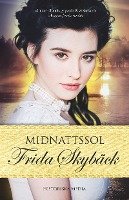I Midnattssol möter vi återigen de tre systrarna Cecilia, Elisabeth och Amelie vid 1800-talets mitt.
Våren är kommen till gården Rosenlund och för systrarna Stiernfors råder ett sällan skådat lugn. Men lyckan visar sig vara både skör och tillfällig. Ett oväntat besked från Cecilias make tvingar henne tillbaka till Apelgården, där ett tungt ansvar vilar. I Lund kämpar Elisabeth för ensamma mödrar och deras barn, som inte är välkomna till den nyöppnade barnstugan. Yngsta systern Amelie lever ett glamoröst liv som nygift med greve Carl Piper, men ett oväntat besök omkullkastar hennes bekväma tillvaro.
Midnattssol är fortsättningen på historien om systrarna Stiernfors. Det är ett fängslande drama om kärlek, systerskap och om att vara kvinna under 1800-talet.

